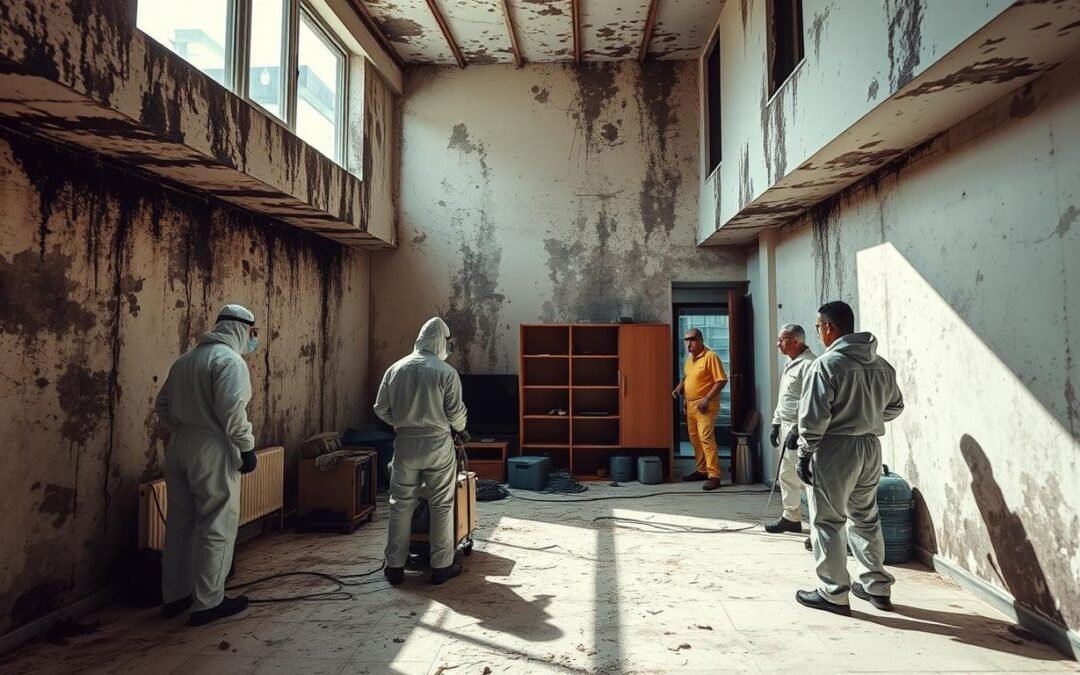Mold is a big problem in many Singapore homes. The country’s tropical climate means humidity often hits over 80%. This high humidity helps mold grow, harming health and property.
It’s key for homeowners and businesses to know about mold. They need to keep their spaces safe and healthy. Professional mold removal services are a must to deal with these issues well. Companies like Disaster Restoration Singapore are experts in removing mold and improving air quality.
Next, we’ll look at the types of mold in Singapore, health risks, and how to remove it. We’ll also talk about how to prevent mold and keep homes safe. Regular checks and proactive steps are important for a mold-free home.
Key Takeaways
- Mold thrives in Singapore’s humid climate, often leading to health risks and structural damage.
- Professional mold remediation is vital as DIY methods may fail to address moisture source issues.
- Understanding common mold types and their health impacts guides effective prevention strategies.
- Regular inspections are key to catch mold problems early before they get worse.
- Maintaining indoor humidity levels between 30% and 50% helps prevent mold growth.
Understanding Mold and Its Impact on Singapore Homes
Mold is a fungus that loves warm, damp places. Singapore’s climate is perfect for it. It spreads through tiny spores that can float and settle on surfaces. These spores wait for the right humidity and moisture to grow.
Knowing what mold is helps homeowners manage and fix it.
What is Mold?
Mold needs moisture to grow and thrives in Singapore’s humid climate. It’s common in bathrooms, kitchens, and places without good air flow. Understanding mold helps homeowners spot dangers and act fast.
Common Types of Mold Found in Singapore
Many mold types are found in homes here, including:
| Mold Type | Common Locations | Health Risks |
|---|---|---|
| Aspergillus | Bathrooms, air conditioning units | Allergies, respiratory issues |
| Cladosporium | Wood surfaces, fabrics | Asthma aggravation, skin irritation |
| Stachybotrys | Water-damaged areas | Toxic reactions, respiratory infections |
Spotting these molds early is key to fixing them and keeping healthy.
The Health Risks Associated with Mold Exposure
Mold can harm your health, more so for those with allergies, asthma, or weak immune systems. Symptoms include stuffy nose, throat irritation, coughing, and skin problems. Long-term exposure can lead to serious issues like respiratory infections and fungal sinusitis.
Mold Remediation: Importance and Methods
Managing mold infestations is key to a healthy home. Professional mold remediation tackles mold problems caused by moisture. In Singapore’s humid climate, mold grows fast. Quick action is vital for homeowners.
Specialized services provide expert mold removal and treatment. They fix the mold’s root cause, protecting your property long-term.
Why Professional Mold Remediation is Crucial
Professional mold remediation is vital for several reasons. It ensures a detailed check of mold areas, finding and fixing all mold sources. Experts use advanced techniques and tools to remove mold safely.
This approach greatly reduces health risks like allergies and respiratory problems. It’s safe for people with weak immune systems.
DIY vs. Professional Approaches to Mold Remediation
DIY mold removal might seem cheap but often doesn’t solve the problem. Professionals offer a complete mold removal process. This includes inspection, containment, and mold removal with advanced methods.
Without proper tools and knowledge, DIY efforts can make things worse. Professional mold remediation provides lasting solutions, while DIY can lead to more problems.
The Mold Remediation Process and Advanced Techniques
The mold remediation process involves several key steps:
- Inspection and Assessment: Experts find mold and moisture sources.
- Containment: Steps are taken to stop mold spores from spreading.
- Removal: Advanced techniques are used, including HEPA filters and air scrubbers.
- Cleaning and Sanitization: Areas are cleaned and sanitized to remove spores.
- Prevention: Strategies like good ventilation and dehumidification prevent future mold.

Choosing professional mold remediation has big benefits over DIY. It ensures safe, thorough, and lasting results, fitting Singapore’s unique environment.
Conclusion
Mold remediation is key to keeping homes and businesses in Singapore safe. It’s important to know about mold types, health risks, and the need for professional help. This knowledge helps property owners tackle mold problems effectively.
Mold can cause breathing issues, allergies, and skin problems. Quick action is vital to avoid these issues getting worse. This is even more important for people who are very sensitive to mold.
Using good mold remediation solutions is important. It helps keep people healthy and protects buildings. Mold damage can cost a lot, from $500 to $30,000, depending on the problem.
Properties with mold issues might lose up to 30% of their value. But, getting professional help can save a lot of money in the long run. Experts can stop mold from coming back by up to 90% by controlling moisture and air flow.
In a humid place like Singapore, it’s important to act fast. Homeowners should get help from mold experts to keep their homes safe and healthy. With the right plan and help, you can make your home mold-free, improving your health and property value.

